Civil Liberties, Civil Rights, Cuba, Gaza, Guantanamo, Human Rights, Prison Industry, Racist Police Violence, Supreme Court, Targeting Muslims, Torture, Truth to Power, U.S. Militarism, Violations of U.S. and International Law, War Resister, Whistleblowers
Podcast: Play in new window | Download
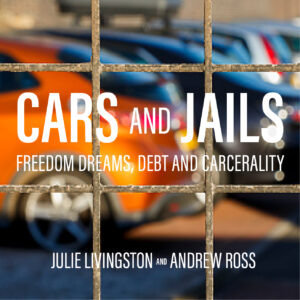

Cars and Jails: Freedom, Dreams, Debt and Carcerality
What is the connection between cars and jails? Every day more than 50,000 Americans are pulled over by police officers while driving. Most of them will come away from this encounter owing money to the municipality or county in which they were stopped. Some will be arrested. They will join the nearly 9,000,000 Americans to cycle through our countries’ jails each year.
Police can choose from hundreds of traffic code violations to make a pretext stop and conduct a vehicle search. This may result in a fine or or an arrest.
American consumer lore has long held the automobile to be “freedom machine” consecrating the mobility of a free people. Yet paradoxically, the car also functions at the crossroads of two great systems of unfreedom and immobility – the credit economy and the American carceral system.
Guest – Andrew Ross who along with his co-author Julie Livingston has investigated this paradox and written the book “Cars and Jails: Freedom, Dreams, Debt and Carcerality”. It was just published by OR Books. The book shows how the long arms of debt and the carceral state operate in tandem in the daily life of car use and ownership. Andrew Ross is a professor of social and cultural analysis at New York University, and a social activist and analyst. He has authored and edited numerous books and has written for the New York Times, the Guardian, The Nation, and Al Jazeera.
—-
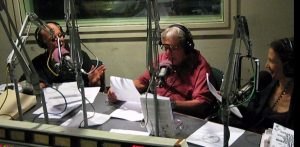
Remembering Michael Ratner
Hosts Heidi Boghosian and Michael Smith remember Michael Ratner as cohost, activist, radical attorney, author and close friend. In this show, hosts reflect on Michael’s work and listen back to several monologue updates. They include his work as co-counsel for Wikileaks founder Julian Assange, the Dahiya Doctrine, SNAP- Survivors Network of those Abused by Priests, NSA survelliance in the Bahamas and Guantanamo Bay prisoner exchange.
Michael Ratner (1943-2016) was president emeritus of the Center for Constitutional Rights and author of Guantanamo: What the World Should Know. Michael worked for decades, as a crusader for human rights both at home and abroad litigating many cases against international human rights violators resulting in millions of dollars in judgments for abuse victims and expanding the possibilities of international law. He acted as a principal counsel in the successful suit to close the camp for HIV-positive Haitian refugees on Guantanamo Base, Cuba. Michael Ratner has litigated a dozen cases challenging a President’s authority to go to war, without congressional approval. In the wake of the September 11 attacks, the Center has focused its efforts on the constitutionality of indefinite detention and the restrictions on civil liberties as defined by the unfolding terms of a permanent war. Among his many honors were: Trial Lawyer of the Year from the Trial lawyers for Public Justice, The Columbia Law School Public Interest Law Foundation Award, and the North Star Community Frederick Douglass Award.
Hosted by Attorneys Michael Smith and Heidi Boghosian

——————————
Civil Liberties, Civil Rights, Criminalizing Dissent, Human Rights, Political Prisoner, Prison Industry, U.S. Militarism, Violations of U.S. and International Law, War Resister
Podcast: Play in new window | Download
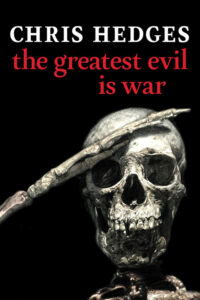
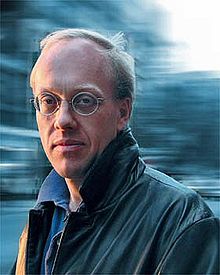
The Greatest Evil is War
United States has been at war almost continuously over the last 80 years. Chris Hedges has titled his latest book, The Greatest Evil is War. He is our guest today. What is the driving force behind this nearly a century of war? Who is responsible? What are the institutions in United States that carry it on? What is to be done about it?
What forces in our country can stop the slaughter and the constant waste of resources that is consuming us and threatening us with the possibility of nuclear war, which would wipe out all life on our planet. Today we will explore the economic, institutional, and ideological underpinnings of the American war machine. We will talk about the military industrial complex about which Eisenhower warned us. We will talk about its handmaidens, the media, Congress, the universities and the think tanks which advocate for war.
We will talk about the political consequences of permanent war and the fascist direction America is increasingly going in. Most profoundly we will talk about capitalism and fascism from which it springs. And finally we will talk about the social forces necessary to stop and reverse war.
Guest – Chris Hedges spent two decades as a foreign correspondent, 15 of them with The New York Times, covering conflicts in Central America, the Middle East, Africa and the former Yugoslavia. He learned overseas that the evils of empire are the external expression of white supremacy, just as mass incarceration, which he describes as the civil rights issue of our age, is the most brutal internal expression of white supremacy. Prisons , he writes, are the modern iteration of slave plantations. Hedges is the author of 14 books, The winner of a Pulitzer Prize for journalism, a graduate of Harvard Divinity school, and an ordained Presbyterian minister. chrishedges.substack.com
—-
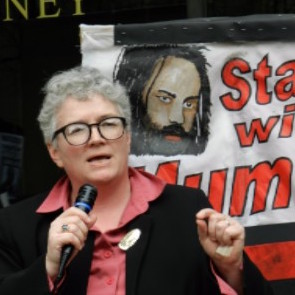
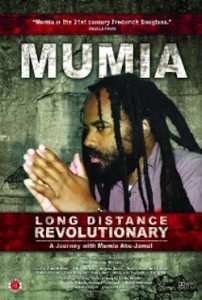
American political prisoner Mumia Abu-Jamal has served 40 years Is Pennsylvania’s harshest prisons-16 of them on death row -for the murder of a Philadelphia police officer which he did not commit
The judge who convicted him was overheard promising“I’m going to help fry the N-word“.
Mumia is an important figure in African-American history. Before his conviction he was a nationally broadcast award winning radio journalist and the head of the Philadelphia Association of Black journalists. He reported on the murderous racial violence of the Philadelphia police department and it’s notorious Police Chief and then Mayor Frank Rizzo.
He had been a member of the Philadelphia chapter of the Black Panther Party. While in prison Mumia has written 13 books and had a weekly radio show “ Live from Death Row“. He holds a masters degree and is working on a PhD in history.
On October 26, 2022 Mumia’s attorneys appeared in court in an effort to get him a new trial. His defense petition included newly discovered evidence that had been buried in the prosecutor’s files. This evidence documented a key witness receiving promises of money for their testimony and evidence of favorable treatment of another in a criminal case. The petition also documented the unconstitutional practice of striking Black jurors during Mumia’s original trial.
Judge Lucretia Clemons preliminarily denied his constitutional right to present this information. She is likely to finalize this ruling on his upcoming court date in Philadelphia on December 9, 2022.
Guest – Noelle Hanrahan is the director of Prison Radio, a multimedia production studio that brings to the public the voices of incarcerated women, men and children. She seeks to honor the agency and humanity of prisoners by bringing their uncensored essays into mainstream discourse. She has produced over 3,500 multimedia recordings from over 100 prison radio correspondents, including the critically acclaimed work of Mumia Abu-Jamal. In 1995, she brought out of prison his first book, Live From Death Row (Harper Perennial), which became a best seller. In 2013, she co-produced the theatrically released feature documentary Mumia: Long Distance Revolutionary (Street Legal Cinema/First Run Features). She received her BA in Gender, Race and Class in the 19th and 20th Centuries from Stanford University, and an MA in Criminal Justice from Boston University. She also holds private investigator licenses in Pennsylvania and Rhode Island.

————————————–
Civil Liberties, Civil Rights, Human Rights, U.S. Militarism, Violations of U.S. and International Law, War Resister
Podcast: Play in new window | Download
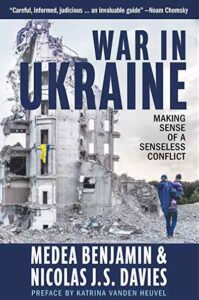

War in Ukraine: Making Sense of a Senseless Conflict
Since February 24, 2022, the day that Russia illegally invaded Ukraine, hundreds of thousands of Ukrainians and Russians have been killed or otherwise become casualties. Eight million Ukrainians have been forced to flee their homes, and hundreds of thousands of Russians have fled conscription. Millions of people in Ukraine have no heat, electricity or water and temperatures are below freezing. The war has devastated 35% of Ukraine’s economy.
Western sanctions on Russia have led to skyrocketing inflation in Europe, and a dangerous squeeze on energy supplies is crippling manufacturing. The war has also devastated infrastructure, reducing electrical grids, railways, apartment buildings and oil depots to rubble. It has filled the air with pollutants and toxic waste that is contaminating rivers and groundwater.
The war is also exacerbating the climate crisis. The fossil fuel industry is profiting from the sanctions which provide it with an excuse to increase dirty energy exploration and production.
The Western media portrays the war as a conflict between the evil empire Russia and the innocent Ukraine. Lost in the heartbreaking images, however, is a nuanced understanding of the context for the war, what caused it, and how it can be ended. The role of the United States in the historical backdrop to the war and the current U.S. resistance to a peaceful settlement are absent from the coverage in the corporate and even much of the alternative media.
Guest – CodePink co-founder Medea Benjamin, who has co-authored with Nicolas Davies the new book, “War in Ukraine: Making Sense of a Senseless Conflict.” Medea is one of the leading activists of our time. Wherever people are hurting, we can expect to see Medea and CodePink there.
—-

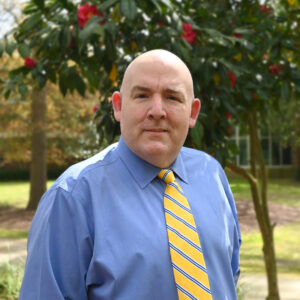
Disengaging from Violent Far Right Extremism
Since 2019, the number of white nationalist networks in the United States has been declining. More centralized ones, however, are supplanting them. An example of this, according to the Southern Poverty Law Center, is how founders of the podcast platform The Right Stuff have switched from organizing “pool party” groups to focusing on building the racist and antisemitic National Justice Party.
Many prominent leaders in this new iteration of white nationalism say their primary goal is to challenge “Conservatism, Inc.” Live-streamer Nick Fuentes is one. He recently dined with Donald Trump and Kanye West at Mar-a-Lago and was present outside the U.S. Capitol on Jan. 6, 2021. Fuentes seeks to harness the grievances of Trump supporters into an overtly ethno-nationalist political movement, forming the Republican party’s core.
Ideas once confined to the organized white power movement are now openly discussed within the broader political right. The so-called “great replacement” conspiracy, holding that white people are being systematically replaced across the Western world by “multiculturalists” and Jews, is routinely cited as a reality by some elected officials and media pundits.
Guest – Patrick Riccards is the CEO of Life After Hate, an organization that helps people leave the violent far right. Founded in 2011 by former violent extremists, it’s the only nationally recognized and federally funded nonprofit positioned to assist those wishing to disengage from violent far right extremism. An expert in education, Patrick also founded the Driving Force Institute for Public Engagement, an initiative aimed at transforming how U.S. history and civics are taught. An award-winning writer, Patrick serves on the boards of several nonprofits.
Hosted by attorneys Heidi Boghosian, Marjorie Cohn and Julie Hurwitz

—————————————————
Civil Liberties, Civil Rights, Human Rights, Supreme Court, U.S. Militarism, Violations of U.S. and International Law
Podcast: Play in new window | Download
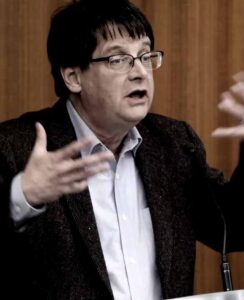
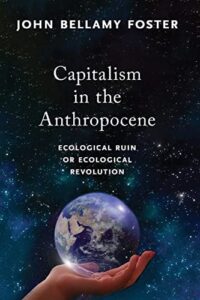
Capitalism in the Anthropocene: Ecological Ruin or Ecological Revolution
Time is running out for humanity to avoid a catastrophic planetary tipping point. The globalized system of capital accumulation has induced humanity to foul it’s on nest. The result is a planetary emergency that threatens all present and future generations and thrown into question the continuation of civilization and ultimately the very survival of humanity itself. Only by addressing the social aspects of the current planetary environment is it possible to develop the ecological and social resources for a new journey of hope.
The United Nations international panel on climate change, the IPPC, predicts that as a result of the increase in greenhouse gases by the year 2050 there will be 1 billion climate refugees. Temperatures must be held within a 1.5 Celsius increase. If it goes up, as predicted, an increase of 4 degrees would end civilization.
The crises we are in our multiple. Species extinction, ocean acidification, sea level rise depletion of soil, forest fires, broiling heat waves, hurricanes and drought have plagued us in the last few years. One third of Pakistan was underwater.
Guest – John Bellamy Foster, editor of Monthly Review magazine and a professor emeritus of sociology at the University of Oregon. He has written many books including The Robbery of Nature“ and “The Return of Nature. His most recent book is Capitalism in the Anthropocene: Ecological Ruin or Ecological Revolution.
—-
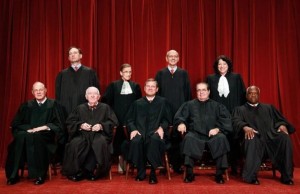
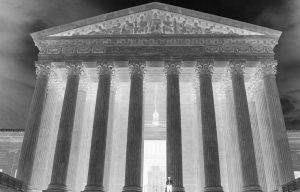
Impending Threats To American Democracy
In a recent New York Times article, by David Leonhardt, titled A Crisis Coming: The Two Twin Threats to American Democracy, Leonhardt, after first identifying the first threat being that things are now in place where for the first time in U.S. history, a legitimately elected president will not be able to take office, he identifies the second threat, as follows: “The second threat to democracy is chronic but also growing: the power to set government policy is becoming increasingly disconnected from public opinion. The run of Supreme Court decisions—both sweeping and, according to polls, unpopular—highlight this disconnect. Although the Democratic Party has won the popular vote in seven of the past eight elections, a Supreme Court dominated by Republican appointees seems poised to shape American politics for years, if not decades.”
And another headline in a recent edition of the New York Times reads, “Three Huge Supreme Court Cases That Could Change America.” And that article is simply one of many, of late, warning of how the ever-more conservative, indeed one could say, “reactionary” Supreme Court, in its just opened fall term, may well change America in a number of vastly different ways…and ways inconsistent with the majority political views of the American people.
Guest – Steve Rohde is the past chair of the ACLU Foundation of Southern California, the founder and current chair of Interfaith Communities United for Justice and Peace. He is a widely recognized expert on the U.S. Constitution, as well as a political activist. He is a prolific author. His books include American Words of Freedom and the book Freedom of Assembly. He has written numerous book reviews and articles on civil liberties and constitutional law, and his book reviews can be found frequently in the Los Angeles Review of Books.
Hosted by Attorneys Michael Smith and Jim Lafferty

————————————————-
Civil Liberties, Civil Rights, Climate Change, Human Rights, Political Prisoner, Prison Industry, U.S. Militarism
Podcast: Play in new window | Download
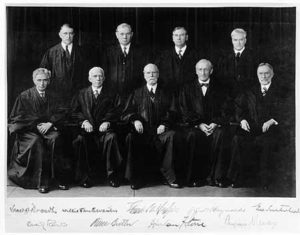
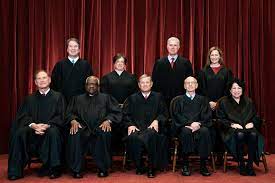
Far Right Supreme Court Decisions Not Seen Since 1931
During its last term, the Supreme Court demonstrated that it is the most right-wing court since 1931. In cases involving reproductive rights, entanglement of church and state, the right to carry guns, and the ability of congressionally-mandated administrative agencies to regulate climate change, the high court’s conservative members handed down reactionary rulings. The court has agreed to hear a case next term that could radically change our electoral system.
Guest – Stephen Rohde is an author and social justice advocate who practiced civil rights and constitutional law for more than 45 years, including representing two men on California’s death row. He is the former chair of the ACLU Foundation of Southern California and former national chair of Bend the Arc, a Jewish Partnership for Justice. He is also a board member of Death Penalty Focus.
—-
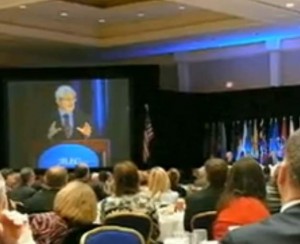
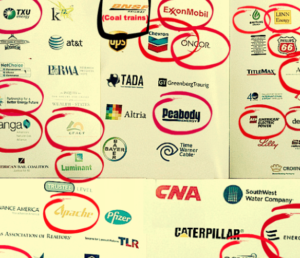
ALEC: Five Decades of Government Influence
The United States underwent a “public interest” revolution in the 1960s and early 1970s. In the first half of the ’60s, Congress passed precedent-setting environmental laws, including the Clean Air Act, the Clean Water Act, and the Water Quality Act. And in just three years, from 1969 to 1972, the federal government adopted a raft of new environmental, public health, workplace and consumer protections and established new agencies to administer them, including the Environmental Protection Agency and the Occupational Safety and Health Administration.
That revolution sparked a counterrevolution that is still reverberating today. Wealthy conservatives, corporations and libertarian foundations poured money into new think tanks and advocacy groups, including the Heritage Foundation and Charles Koch’s Cato Institute. A less-well-known group, the American Legislative Exchange Council, was founded around the same time. It goes by its acronym, ALEC.
Unlike Heritage and Cato, ALEC—a network of nearly 300 corporations, trade groups, law firms, and libertarian foundations—operates at the state level. The group provides state legislators with a variety of ready-made bills that, among other things, roll back voting rights, thwart efforts to address climate change, and bolster corporate profits.
State lawmakers introduced nearly 2,900 bills based on ALEC’s recommendations from 2010 through 2018, according to an investigation by USA Today, the Arizona Republic and the Center for Public Integrity. More than 600 of them became law.
Lately ALEC has been coaching state legislators on how to spin the recent Supreme Court decision overturning Roe v. Wade. ALEC has also been working behind the scenes to amplify the false GOP narrative on voter fraud. Writer Elliott Negin has been following ALEC off and on for the last decade, and he recently posted an essay that explains in detail how ALEC turns disinformation into law. We are fortunate to have Elliott as our guest today.
Guest – Elliott Negin is a senior writer at the Union of Concerned Scientists, a national science advocacy organization. Prior to joining UCS in 2007, he was the Washington communications director for the Natural Resource Defense Council, a former news editor at National Public Radio, the managing editor of American Journalism Review, and the editor of Nuclear Times and Public Citizen magazines.

—————————————————
CIA Sponsored Terror, Civil Liberties, Civil Rights, Human Rights, U.S. Militarism
Podcast: Play in new window | Download
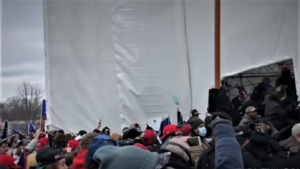
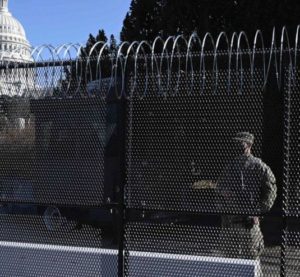
The Menace of American Authoritarianism
Law And Disorder Radio was launched 18 years ago by four lawyers for the purpose of defending democracy and the rule of law.
This was just after the United States attacked Iraq under the false pretense that Iraq harbored weapons of mass destruction.
We have seen democracy and the rule of law consistently disintegrating. Starting perhaps 40 years ago under the Reagan administration, this disintegration has brought us to the crisis of today. A committee of the House of Representatives is actually holding televised hearings on the attempted coup d’état by the last president, Donald Trump.
At the first hearing, it was demonstrated that Trump planned to ignore the results of an election which he lost by 7 million votes. The insurrection that he initiated was unsuccessful. The Capitol was attacked after Trump incited the insurrectionists and Trump did nothing to stop it for over three hours. When Vice President Mike Pence refused to go along with Trump’s scheme to overthrow the election results, Trump suggested that hanging Pence was a good idea. The insurrectionists had built a gallows on the grounds of the Capitol.
What has brought us to this critical point?
We live in a country where inequality is increasing, where, as Bob Dylan wrote, “money doesn’t talk; it swears.“ Nearly half the population is poor or near poor. Neoliberalism, an extreme form of capitalism, has taken hold and hollowed out the country. Schools have been privatized and there is no national healthcare system. Students are 1.7 trillion dollars in debt just as a result of attending college. The country’s infrastructure is crumbling, there’s no decent railroad service, there are mass shootings almost every day, and the US government is spending $813 billion on war this year. The United States refuses to help negotiate a peace agreement between Russia and Ukraine. The twin threats of nuclear war and climate catastrophe hang over our heads. Things are dreadful. We have reached a point summarized by the great Italian revolutionary Antonio Gramsci, who was imprisoned by a fascist dictator. Gramsci famously wrote from his prison cell: “The old world is dying, and the new world struggles to be born: now is the time of monsters.”
Guest – Professor Henry A. Giroux currently holds the McMaster University chair for a Scholarship in the Public Interest in the English and Cultural Studies Department. He has written many books, most recently The Public in Peril: Trump and the Menace of American Authoritarianism and American Nightmare: Facing the Challenge of Facism.
—-
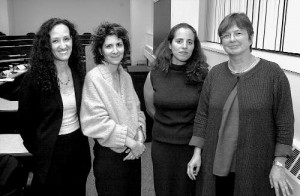
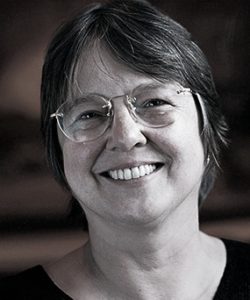
Lawyers You’ll Like: Professor Holly Maguigan
In our Lawyers You’ll Like series we’re joined by Professor Holly Maguigan, Professor of Clinical Law at the New York University School of Law, where she teaches Comparative Criminal Justice Clinic: Focus on Domestic Violence and Evidence. Professor Maguigan is an expert on the criminal trials of battered women. Her research and teaching is interdisciplinary. Professor Maguigan is a member of the Family Violence Prevention Fund’s National Advisory Committee on Cultural Considerations in Domestic Violence cases. She serves on the boards of directors of the National Clearinghouse for the Defense of Battered Women and the William Moses Kunstler Fund for Racial Justice. She is a past co-president of the Society of American Law Teachers, the largest membership organization of law professors in the U.S.
Professor Holly Maguigan:
- I was doing medieval history and I was at Berkeley. It was 1967 and Oakland stopped the draft.
- I got very interested in the anti-war politics.
- I hated lawyers. I really hated lawyers. They were boring. They talked about themselves all the time. They only had stories about their cases and how great they were and they would never post bail when people got arrested.
- The University of Pennsylvania in Philadelphia is where I stayed for 17 years.
- First I started out as a public defender. I loved being a public defender, it was the beginning and end of everything I hoped it would be.
- That’s where I met David Rudovsky and David Kairys. They were then defenders while I was a student.
- After they went out on their own, they kept inviting me to join them. I kept putting it off because I loved being a defender so much.
- In Philadelphia there was much more actual litigation, not just motion litigation there’s a lot of that here in New York City but actual trials.
- You had a sense, there was an analysis that people were doing life on the installment plan and you needed to do what you could to kick them loose any particular time.
- It was a community in its own odd way and I found it difficult to leave it.
- I was doing major felonies within a couple of years.
- David Kairys was very focused on constitutional litigation and government misconduct. He did the Camden 28 which was a big draft resistance case.
- My interest was more into criminal defense.
- Grand juries (all over the country) convened to investigate the alleged transportation of Patty Hearst by the SLA from California where she had been captured.
- He was a killer. (Frank Rizzo) There was no question. More people died in police actions before or since.
- I don’t mean to suggest that all the police started out as homocidal. This was a situation which from the top down came the message if you’re a good cop then you’re going to take people out however you think you need to.
- I knew about race and class bias in the court room as much as a white woman who was middle class could know.
- I was just blown away by what happens when you add hatred of women to hatred of black people and hatred of poor people.
- Judges would go by me in the hall and say Maguigan, ahem, you didn’t give me anything this Christmas, not even one lousy bottle, you’re not getting any assignments.
- Judges would do things, like open the drawer in their chambers, and there would be wads of bills, and they’d let you know.
- I developed a specialty on women who kill men.
- In the early eighties a group in Philadelphia called Women Against Abuse began working and they did advocacy for battered women accused of crime and meant a huge difference.
- The battered women cases I was working on were quite consuming because people then didn’t know very much in how to try these cases.
- The judges expected you to plead insanity or guilty. Reasonable doubt was a consideration at sentencing not at trial.
- There were cases that did require teams. There was no question.
- I wanted to be in court. I wanted to be in the presence of that conflict between the authorities and regular people.
- I went to NYU where I taught in the criminal defense clinic for many years.
- To see students react to the great stories their clients have is just amazing.
- SALT (Society of American Law Teachers) is about who gets into law school, what they learn and who teaches them. It’s about access to justice. It’s about relating to law school as a place where you train people to do social justice. SALT’s focus is on students and teaching.
- Holly Maguigan to be honored by Society of American Law Teachers.
Guest – Professor Holly Maguigan teaches a criminal defense clinic and one in comparative criminal justice as well as a seminar in global public service lawyering and a course in evidence. She is an expert on the criminal trials of battered women. Her research and teaching are interdisciplinary. Of particular importance in her litigation and scholarship are the obstacles to fair trials experienced by people accused of crimes who are not part of the dominant culture. Professor Maguigan is a member of the Family Violence Prevention Fund’s National Advisory Committee on Cultural Considerations in Domestic Violence cases. She serves on the boards of directors of the National Clearinghouse for the Defense of Battered Women and the William Moses Kunstler Fund for Racial Justice. She is a past co-president of the Society of American Law Teachers, the largest membership organization of law professors in the U.S.

———————————————–























